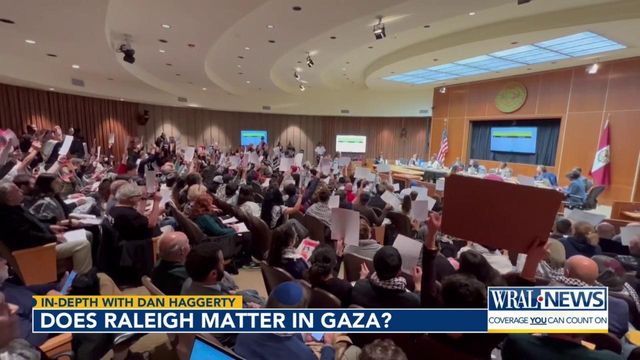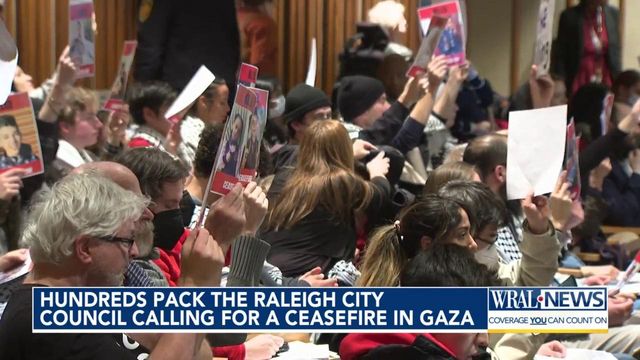Examining the calls for the Raleigh City Council to adopt a ceasefire resolution amid the Israel-Hamas war
Hundreds of people are adamant that the Raleigh City Council adopt a ceasefire resolution about the war between Israel and Hamas.
More than 200 people showed up Jan. 16 to the city council meeting and many of them spoke, causing the meeting to go until almost 11 p.m.
Since October 2023 when the war erupted, hundreds of people in Raleigh have called for a ceasefire resolution.
Many of the people who signed up to speak last week have been relentless with their efforts – and have rarely missed a chance to share their passion – and at times, that passion turns into heated debate and angry disagreements that can be disruptive.
A WRAL News viewer named Lois emailed after the most recent city council meeting and said, “What baffles me is why no demonstrations for a ceasefire in the Ukraine-Russia conflict? Why only in Gaza?”
Why not Sudan either? Sudan is suffering through a military conflict that’s killed thousands of people in less than a year. The United Nations called it the world’s largest human displacement crisis. It’s a conflict spurred by foreign invasions, ethnic tensions, religious disputes and fights over resources.
Other people have scratched their heads at the whole thing – calling it frivolous – and asking, “what impact would Raleigh, North Carolina, have on a conflict in another country, half a world away?”
What are the chances a resolution signed by Raleigh city council members has an actual impact on a war between two groups that have been, in some respects, at odds for thousands of years – rooted in religion and land rights?
For those of you who think this call for a “ceasefire resolution” is frivolous or performative or a distraction – from some perspectives – you’re exactly right.
Last week, the Ann Arbor School Board in Michigan passed its ceasefire resolution.
In what world does a Michigan school board have a direct impact on a foreign war? Not this one. After passing its resolution, nothing happened.
Several cities throughout the U.S. have passed resolutions, yet the war has raged on. That list includes:
- San Francisco, California
- Oakland, California
- Richmond, California
- Cudahy, California
- Bridgeport, Connecticut
- Wilmington, Delaware
- Atlanta, Georgia
- Detroit, Michigan
- Dearborn, Michigan
- Dearborn Heights, Michigan
- Hamtramck, Michigan
- Ypsilanti, Michigan
- Albany, New York
- Akron, Ohio
- Providence, Rhode Island
Resolutions are generally more symbolic than ordinances. While the resolutions calling for a ceasefire are symbolic and may not have teeth of their own, to call it frivolous would be naive.
Some of the biggest changes in the history of our country have come from symbolic gestures. For example, Rosa Parks refused to give up her bus seat during the Civil Rights movement, and now we learn about her in school.
That moment spurred more moments and those moments led to new leadership and change in policy.
As of Tuesday, U.S. policy supports this war. The U.S. government continues to send billions in aid to Israel without calling a for a ceasefire in the bombardment of Gaza.
When U.S. Sen. Bernie Sanders, D-Vermont, opposed giving Israel $10 billion in aid over human rights concerns – lawmakers shut him down.
Could a protest in Raleigh change that? And even if it did, would American policy truly sway the agendas in Israel dramatically enough to end a war?
Regardless, we have seen the power of symbolic, social movements to create real change.











